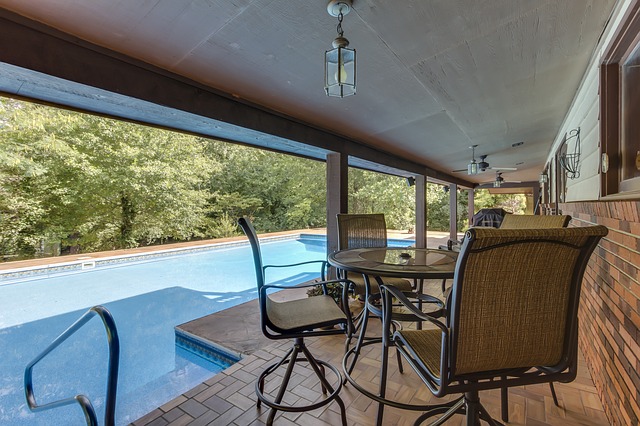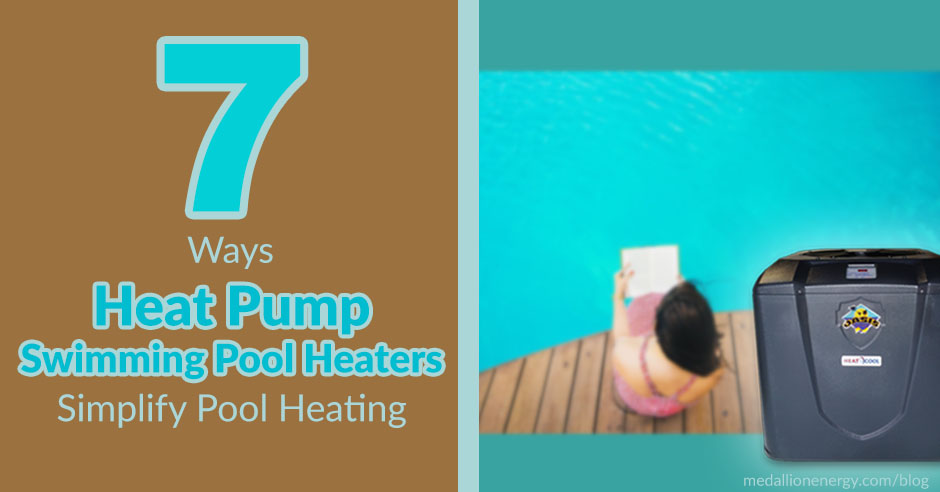With each season, heat pump swimming pool heaters become more and more popular as the go-to pool heating option. And as one of the most reliable and cost-effective options, that shouldn’t come as a surprise.
However, what many people don’t realize is just how much simpler pool heat pumps make pool heating. Depending on what type of pool heater you use, factors like the weather, heating costs, lifespan, and even the sun can drastically affect your ability to enjoy a warm, comfortable swim. When YOU want to.
But with pool heat pumps, most of the typical pool heating problems go right out the door. And in this post, we explain how heat pump pool heaters not only save you money and simplify pool heating but make your job as a pool owner way easier.
So if you want to find out how using a pool heat pump can enhance your life and help you spend more time in the pool, keep reading.
7 Ways Heat Pump Pool Heaters Simplify Pool Heating
Provide energy efficient performance



You’ve probably heard about pool heat pumps being energy efficient. But what exactly defines that?
We’ll start by saying that they offer THE most energy efficient performance of all pool heaters in terms of cost to heat. And by a large margin.
Let’s take a quick look at two popular pool heaters:
Electric resistance heaters provide quick heating, but since they work just like an electric stovetop, their pull on electricity is heavy. This is because their primary method of generating heat is by applying raw electricity to a heating element. Although effective, this pulls electricity the fastest, making it the least efficient for heating anything bigger than a hot tub.
Gas pool heaters work a little bit different but are known for their quick heating speeds as well. Because of this, they’re ideal for smaller pool or spas.But while fast heating may be a plus in certain conditions, there’s one important thing to remember. Gas pool heaters run on gas, which is more expensive than electricity. Often 3x more per month.
On the other hand, pool heat pumps can provide just as much heat to your pool per month as gas or electric, but at less than half the cost. That’s energy efficiency defined.
Pay for themselves in savings
The main argument for choosing a gas or electric heater, aside from speed, is that they’re usually cheaper up front. And that’s true.
Often times, they’re half the cost to purchase.
But beyond the initial purchase, there are still a few important factors to consider:
- Installation cost
- Monthly operating cost
- Maintenance cost
As you know, while gas heaters are cheaper to purchase, they cost nearly 3x as much to run per month when compared to a pool heat pump. But let’s not forget that a gas heater not only requires a connection to your pool’s plumbing system but a direct gas supply line too.
And if you’re city doesn’t provide city gas lines, then the only other option is buying (and refilling) a propane tank. Another expense added to the installation cost.
Combine that with high operation costs, expensive professional maintenance charges and a short lifespan of less than 10 years (repairs stack up), and the benefits begin to shrink immensely.
The same logic applies to electric resistance heaters.
So then how do heat pump swimming pool heaters pay for themselves?
If you’re using a pool heat pump, you’re saving, on average, $300 per month on heating costs. That’s $300 each month that you otherwise wouldn’t have a gas or electric resistance heater.
And when you multiply that monthly savings by 12 months you’ll realize that a pool heat pump practically pays for itself within the first 1-2 years in savings alone.
Related: 7 Best Ways To Lower Your Swimming Pool Bills By Up To 50%
They work with, or without the sun



But what about solar pool heaters, don’t they provide FREE heat?
Yes, while solar pool heaters do harvest free heat from the sun, they still need to be powered. And the only way to power a solar pool heater is with a pool pump. And as you know, running your pool pump costs money — which cancels out the “free heating” claim of solar pool heaters.
But for now, let’s focus on the good: the fact that solar pool heaters can generate heat from just sunlight. Although an amazing feat, and a wonderful form of eco-friendly heating, there’s one major downside to consider.
Without consistent sunlight, at least a half day’s worth, a solar pool heater won’t do much. Sure, it can gather a little warmth on a hot day, but otherwise, without the sun, it’ll never be enough to keep your pool warm and comfortable.
Heat pump pool heaters follow a different code. Although the sun, specifically the heat it produces, is a major asset to pool heat pumps, it’s not a necessity.
Whether it’s scattered sunshine or full-on gray skies, a heat pump can heat up your pool and keep you warm without a problem.
This is because heat pumps source their heat, from heat itself. The warm air surrounding the heat pump gets pulled in through a special part called an evaporator coil, which kicks off a process that essentially turns natural heat is much hotter usable heat.
Ideal for all climates
While options like solar pool heaters might be a good choice for people living in predominately sunny and warm climates, they’re not well suited for anywhere else really. That’s kind of the whole catch to solar heating: you need lots of sunlight.
So what happens if you live in an area that experiences all four seasons?
And even if you live somewhere like Florida, what happens when the temperature starts dropping closer to the 50s? With our without the sun, colder temperatures change everything for a solar heater.
This is precisely why heat pump pool heaters are the most popular pool heating option today. They work pretty much everywhere. From out west and down south, to the northeast and midwest.
Whether it’s 60 degrees and cloudy or 101 degrees and sunny, you enjoy a comfortable and relaxing swim.
And when the water is too hot, some heat pump pool heaters offer a cooling feature too, which lets you cool down the water to just the right temperature.
That said, there are certain times of the year when it’s best to keep your pool heat pump off. While models like the Oasis Platinum can provide heat down in outdoor temperatures of 30 degrees, most pool heat pumps will see reduced heating efficiency around 50 degrees.
But since these temperatures usually only occur doing a short time period, and in a handful of locations, most pool owners close their pools at this point.
Related: 7 Ways To Extend Your Pool Season By Up To 50%
Longest lasting pool heater



Remember the old saying “quality over quantity”?
Of course, so what sounds better to you:
A pool heater that can easily last you 20 years or more?
Or, a slightly “cheaper” pool heater you need to replace every 7-10 years?
Ten guesses which one is the pool heat pump.
With regular maintenance, pool heat pumps can outlast any other type of pool heater on the market.
Related: 7 Ways To Extend Your Pool Heat Pump’s Lifespan
Perfect for DIY pool heater repair
Are you more of the do-it-yourself type? A pool owner who rather replace their own pump motor, or install a chlorinator themselves?
Well then pool heat pumps are perfect for you.
While gas, electric, and solar heaters require professional help for most repair jobs, pool heat pumps offer a bit more freedom to the DIY pool owner.
With over-the-phone pool heater troubleshooting help, pool owners can be walked through a large majority of repairs by an experienced and professional pool heat pump technician. A technician who also tells you the exact part you need, so you don’t have to waste time calling manufacturers who will only try to upsell you.
On top, of saving time, DIY pool heater repair also:
- Cuts costs by doing the labor yourself
- Teaches you valuable industry knowledge about your pool heat pump, making future repairs easier
- Gets your pool heater fixed faster (often the same day once you have the parts).
Related: 9 DIY Pool Heat Pump Repair Tips
Easier to install



While a gas heater involves everything from adding plumbing connections to a gas supply, heat pumps make things much easier.
Since all a pool heat pump needs are the heat in the air, a simple plumbing connection makes them good to go. That said, the installation will still likely require professional help, but is much faster and affordable than the more complex installations of gas and solar heaters.
Why a heat pump swimming pool heater could be right for you
If the idea of spending more time in the pool, and less money on pool heating bills sounds good to you, than a pool heat pump is the perfect choice for heating your pool. It works in a wide range of climates, with or without the sun, and lasts you as long as you’re willing to let it with good maintenance.
If you have more questions about pool heat pumps, reach out to a pool heat pump specialist today for answers.
If you liked this post, you might also like:
- 9 Ways Owning a Pool Heat Pump Improve Your Health and Your Life
- Pool Heat Pumps 101
- 20 Myths About Pool Heaters: BUSTED


